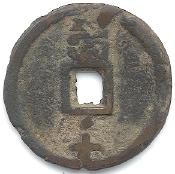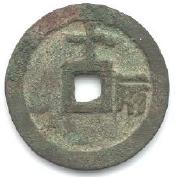I offer this reference guide to Chinese coins with the hope of promoting greater understanding and appreciation these coins but please note THIS IS NOT A LIST OF COINS OFFERED FOR SALE. Joe Lang has given me permission to use images and information from Steven Album rare coins, mostly from their auction results, so I will be adding types and information over time.
Images represent the types and may be larger or smaller than the actual coins.
MEDIEVAL CHINESE COINS, The
TARTAR, MONGOL, MING DYNASTIES
(A.D. 960 to 1644)
This page is a reference guide for Chinese coins issued by the Tartar, Mongol, Ming and other medieval non-Sung Dynasties between (A.D. 960 to 1644), not an offering of coins for sale.
LIAO DYNASTY, AD 907-1125
The Liao were a Tartar Dynasty known as the Ch'i-tan or Ki-tan Tartars, first established by T'ai Tsu in AD 907 during the period of the 5 dynasties. The dynasty lasted for 218 years until AD 1125, ruling from their capital at Beijing. For most of their existence they existed along side the Northern Sung Dynasty, in what appears to be somewhat less than peaceful co-existance.
The first Emperor of Liao did not issue any coins. There were five Emperors between AD 907 and 1031 who issued coins, but only a handful of each type is known to exist and it is unlikely any genuine examples will come on the market. We have not listed them here as it is unlikely anyone viewing this site to identify a coin will have one, but you will find information on them on page 216 of David Hartill's book CAST CHINESE COINS. Schjoth (page 41) notes a record of the Liang Dynasty Emperor Mo, using the reign title Lung-te, issuing large numbers of coins during this period, which are likely what circulated in the Liao region for what little need the Liao people had of coins at that time.
The earliest readily available coins of Liao begin with the Emperor Hsing Tsung during his second reign title of Ch'ung Hsi after he established the first Liao central mint in Manchuria in AD 1053. The mint was not particularly skilled and most Liao coins are fairly crude, poor quality castings.
There are some differences in the dating of the Liao reign titles by Schjoth and Hartill, and we have chosen to use those given by Hartill as it is much more recent and almost certainly more reliable research.
Emperor HSING TSUNG
AD 1031-1055
reign title: CHING-FU, AD 1031
No coins are known to have been cast by Emperor Hsing Tsung with this reign title.
reign title: CH'UNG-HSI, AD 1032-1055
| IMAGE NOT AVAILABLE S-1065 |
S-1065. Bronze 1 cash. Obverse: "CH'UNG-HSI TUNG-PAO". Reverse: blank Average 24 mm. These coins tend to be poorly cast.
VF $250.00Schjoth (page 41) records that "in the 22nd year of Ch'ung-hsi (AD 1053) a cash bureau was established at Ch'ang-ch'un in Manchuria". We assume this is the same as saying a Mint was established there. From this time on, the coinage of Liao becomes much more abundant. We hope to one day look into the events that may have prompted them to take such a move.
Emperor TAO TSUNG
AD 1055-1101
reign title: CH'ING-NING, AD 1055-1064
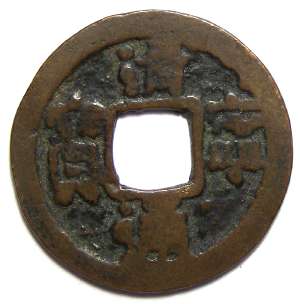
S-1066. Bronze 1 cash. Obverse: "CH'ING-NING T'UNG-PAO". Reverse: blank. Average (1 specimen) 2.57 grams, 24.3 mm (but the specimen was rather worn). These coins tend to be poorly cast, and we apologize for the image of a very worn specimen, bu it is the best specimen we have been able to image.
F $95.00 VF $135.00reign title: HSIEN-YUNG, AD 1065-1074
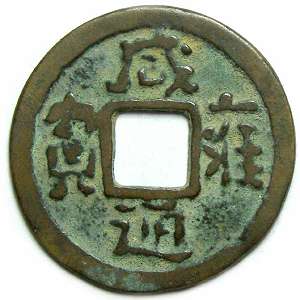
S-1067. Bronze 1 cash. Obverse: "HSIEN-YUNG T'UNG-PAO". Reverse: blank. These very somewhat in weight. Th average of what we have seen (3 specimen) is 24.3 mm and 3.53 grams, but we have seen them from 2.75 to 3.9 grams. As with most Liao coins, this tends to be a a poorly cast issue. It is also the most common coin of the Liao Dynasty.
VF $135.00reign title: TA-K'ANG, AD 1075-1084
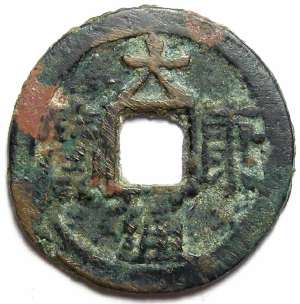
S-1069. Bronze 1 cash. Obverse: "TA-K'ANG T'UNG-PAO". Reverse: blank. Average 24 mm. These coins tend to be poorly cast.
F $115.00S-1068. Bronze 1 cash. Obverse: "TA-K'ANG Y'UNG-PAO". Reverse: blank. Average 24 mm. These coins tend to be poorly cast. We have handled this type, but it was before we started recording values and do not currently have a value for it.
This appears to be the only time when two distinct types were issued during the Liang Dynasty. We note that all Liao coins previous to this reign title were caste with "T'UNG-PAO", and all Liao coins afterwards with "Y'UNG PAO". We assume that means that for this reign title, the T'ung-pao issues are the earlier of the two. We wonder if this might present a clue as to why many Northern Sung reign titles also occur with more than one of these (and other) variations.
reign title: TA-AN, AD 1085-1094
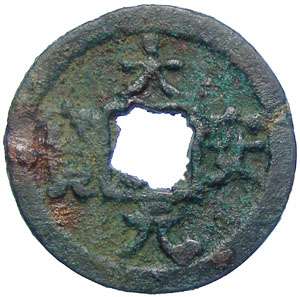
S-1070-71. Bronze 1 cash. Obverse: "TA-AN YUAN-PAO". Reverse: blank. Average (1 specimen) 24.5 mm, 3.51 grams. There are some varieties in this type, with Schjoth noting one with a star hole, and another with a small dot in the upper left corner. We have owned a specimen with a small nail mark on the reverse. These variations would be worth a premium. These coins tend to be poorly cast with slightly irregular rims.
F $95.00 VF $135.00The presence of a dot or nail mark on the reverse, or a star hole on a coin of this type is probably intentional, as similar star holes are very common on Northern Sung coins of this same period. Their meaning is as yet uncertain.
reign title: SHOU-CH'ANG, AD 1095-1101
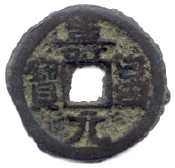
S-1072. H 18.19. Obverse: "SHOU-CH'ANG YUAN-PAO". Reverse: blank. Average (2 specimen) 24.0 mm, 3.62 grams. These coins tend to be poorly cast and somewhat irregular rims, and that must be allowed for in their grading.
F $95.00 VF $145.00Emperor T'IEN CHA
AD 1101-1125
reign title: CH'IEN-T'UNG, AD 1101-1110
| IMAGE NOT AVAILABLE S-1073 |
S-1073. Bronze 1 cash. Obverse: "CH'IEN-T'UNG Y'UNG-PAO". Reverse: blank. Average 24 mm. These coins tend to be poorly cast.
F $95.00 VF $135.00reign title: T'IEN CH'ING, AD 1111-1120
| IMAGE NOT AVAILABLE S-1074 |
S-1074. Bronze 1 cash. Obverse: "T'IEN CH'ING Y'UNG-PAO". Reverse: blank. Average 24 mm. These coins tend to be poorly cast.
F $85.00 VF $120.00This appears to be the last coin issued by the Liao Dynasty, even though the dynasty was to last for another five years after this title ended. Hartill (CAST CHINESE COINS, page 217) discusses and additional group of coins which are sometimes attributed to the Liao Dynasty, although all are rare and seldom encountered types which we have not included here.
WESTERN HSIA DYNASTY
This was a dynasty fo the Tangut people. Their capital was in Kansu Province, but it is not certain if their capital was in Kanchow or Soochow. In AD 1227, after breaking a promise to support Genghis Khan, this dynasty was exterminated.
Emperor JEN TSUNG
AD 1140-1193
reign title: T'IEN-SHENG, AD 1149-1168
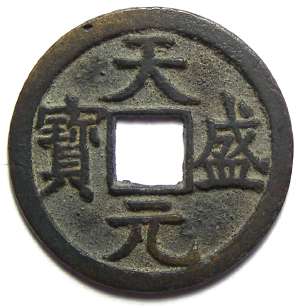
As S-1078 but copper 1 cash. Obverse: 'T'IEN-SHENG YUAN PAO". Reverse: blank. Average (13 specimens) 23.9 mm, 3.51 grams.
F $12.00 VF $25.00These are always well cast coins with bold characters and seldom seen in a grade below gF. The the brass has a very distintive light-brown tone to it. Schjoth says that the copper of this type is rare and that iron is common, but we currently find the opposite to be true
reign title: CH'IEN-YU, AD 1169-1193
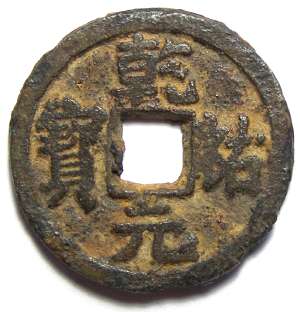
S-1080. Iron 1 cash. Obverse: "CH'IEN-YU YUAN-PAO". Reverse: blank. Average (4 specimen) 24.8 mm, 3.82 grams.
F $35.00 VF $75.00Emperor HSIANG TSUNG
AD 1206-1212
reign title: HUANG-CHIEN, AD 1210-1212
| IMAGE NOT AVAILABLE S-1081 |
S-1081, "HUANG-CHIEN YUAN-PAO". This is an unusual coin in that the inscription starts at the top and is read around to the right, rather then the usual top-bottom-left-right.
gVF $145.00Emperor SHEN TSUNG
AD 1212-1222
reign title: KUANG-TING, AD 1212-1222
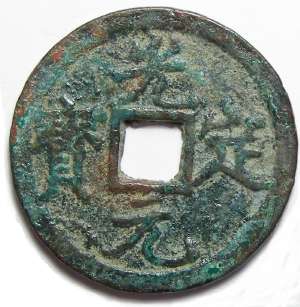
S-1082, "KUANG-TING YUAN-PAO. This is an unusual coin in that the inscription starts at the top and is read around to the right, rather then the usual top-bottom-left-right. The specimens of this type that we have seen tend to be crudely cast from course sand molds. Average (1 specimen) 24.9 mm, 4.07 grams.
F $75.00 VF $110.00CHIN DYNASTY, THE NU-CHENG TARTARS
Emperor WAN-YEN LIANG
AD 1149-1161
reign title: CHENG-LUNG (Zheng Long), AD 1156-1161
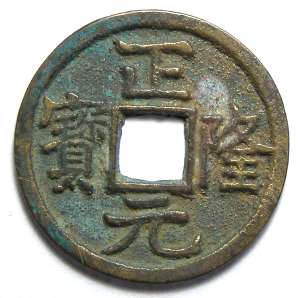
S-1083
S-1083. Bronze 1 cash. Obverse: "CHENG-LUNG YUAN-PAO". Reverse: blank. Average (12 specimen) 3.83 grams. 25.1 mm. This is a well cast coinage, with consistently clear characters, very well formed rims and ussually very little variation in the size and weight between most specimens.
F $6.00 VF $8.50 XF $12.50Emperor SHIH TSUNG
AD 1161-1189
reign title: TA TING, AD 1161-1189
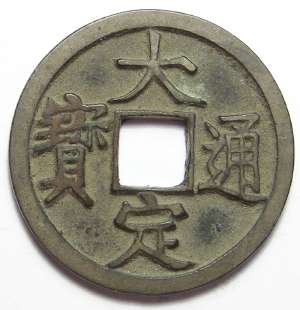
S-1085-1086. Bronze 1 cash. Obverse: "TA-TING T'UNG-PAO" in orthodox script. Reverse: blank. Average (7 specimens) 25.4 mm, 4.14 grams.
F $6.00 VF $8.50 XF $12.50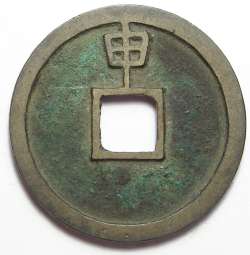
S-1087. Bronze 1 cash. Obverse: "TA-TING T'UNG-PAO" in orthdox script. Reverse: "SHEN" at top indicating this type was struck in AD 1188. Average (2 specimen) 3.29 grams. 24.4 mm.
F $20.00 VF $35.00 XF $55.00S-1088. Bronze 1 cash. Obverse: "TA-TING T'UNG-PAO" in orthdox script. Reverse: "SHEN" at bottom indicating this type was struck in AD 1188. Average (1 specimen) 2.95 grams. 24.5 mm.
F $20.00 VF $35.00 XF $55.00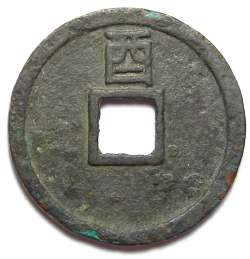
S-1089. Bronze 1 cash. Obverse: "TA-TING T'UNG-PAO" in orthdox script. Reverse: "YU" at top indicating this type was struck in AD 1189. Average (4 specimen) 3.37 grams. 25.6 mm.
F $22.50 VF $39.50 XF $60.00We recently handled a specimen of this type that was only 2.25 mm and 2.3 grams. The patination and casting showed that the coin is genuine from the time, but we suspect it is a contemporary (of the time) counterfeit.
S-1090. Bronze 1 cash. Obverse: "TA-TING T'UNG-PAO" in orthdox script. Reverse: "YU" at bottom indicating this type was struck in AD 1189. Average (1 specimen) 3.50 grams. 25.4 mm.
F $20.00 VF $35.00 XF $55.00S-1091. Bronze 1 cash. Obverse: "TA-TING T'UNG-PAO" in orthodox script. Reverse: "TA-TING T'UNG-PAO" in orthodox script. Schjoth had such a specimen, but we doubt that it was authentic. At 2.75 grams is was light for coins of the period.
S-1092. Iron 1 cash. Obverse: "TA-TING T'UNG-PAO" in orthdox script. Reverse: blank. Schjoth had such a specimen, which weighed 3.41 grams. We cannot confirm if the type actually exists or not, but if it does it has to be very rare and we cannot establish a value at this time.
Emperor CHANG TSUNG
AD 1190-1208
reign title: T'AI-HO, AD 1201-1208
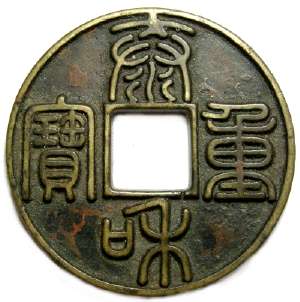
S-1093-94. Bronze 10 cash. Obverse: "T'AI-HO CHUNG-PAO" in seal script. Reverse: blank. The two different Schjoth numbers are for narrow (1093) and wide (1094) rims, with the wide rim variation being the scarcer. We have seen narrow rim examples from 16.29 to 24.3 grams with the average of 3 specimens was 19.91 grams, 44.5 mm. The single wide rim example we saw was 27.75 grams, 47.6 mm.
Narrow - VF $80.00 XF $120.00Wide - VF $125.00 XF $175.00
Schjoth records four specimens of this series, two with blank reverses averaged 16.35 grams, one with Ch'uan Huo on the reverse at 17.24 grams, and one that is most probably a later amulet, with the obverse repeated on the reverse at 32.92 grams. Because of the very high relief of this issue, they are never seen below a grade of VF, and are always very well made coins.
YUAN (MONGOL) DYNASTY
Emperor CH'ENG TSUNG
AD 1295-1306
reign title: YUAN-CHEN, AD 1295-1296
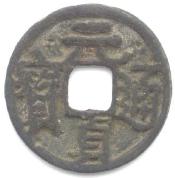
FD-1711. Bronze 1 cash. Obverse: "YUAN-CHEN T'UNG-PAO" in orthodox script. Reverse: blank. Average (1 specimen) 24.2 mm, 3.08 grams.
VF $650.00There is some question in our mind about the authenticity of the specimen illustrated above. We would appreciate hearing form anyone that can give a reasonable informed opinion on it.
Emperor WU TSUNG
AD 1308-1311
reign title: CHIH-TA, AD 1308-1311
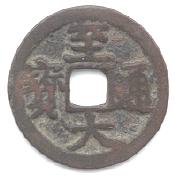 S-1098 orthodox script | 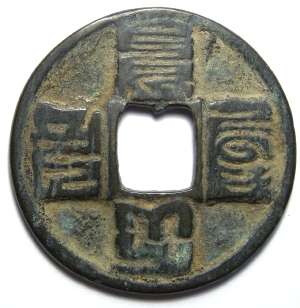 S-1099 Mongolian Seal script |
S-1098. Bronze 1 cash. Obverse: "CHIH-TA T'UNG-PAO" in orthodox script. Reverse: blank. The size and weigh of this issues seems to vary somewhat. The last two specimens we had access two were 24.5 mm at 3.1 grams and 23.5 mm at 2.85 grams.
VG $3.00 F $5.00S-1099, Bronze 10 cash. Obverse: "TA-YUAN T'UNG-PAO" in Mongol seal-writing. Reverse: blank. Average (5 specimens) 42.3 mm, 20.5 grams. These are said to have been first cast in the third year of Chih-Ta (AD 1310). These tend to be crudely cast, often with casting holes in the fields, and attractive specimens are scarce and command a premium.
F $32.00 VF $45.00Paper money was used extensively during this period, although to the best of my knowledge only two examples of Yuan Dynasty paper money are know to still exist today.
Emperor JEN TSUNG
AD 1312-1320
reign title: HUANG-CH'ING, AD 1312-1313
| IMAGE NOT AVAILABLE S-1102 |
S-1101, "HUANG-CH'ING T'UNG-PAO" in orthodox script. Value 1. RARE. Schjoth says there is no mention of coins this reign title in the official records The only specimen was have handled was VG with the top character weakly cast.
I have not yet determined a value.Emperor SHUN TI
AD 1333-1367
Schjoth does not list any coin issued from 1333 to 1334 but there may be some without a reign tital on them with the incriptio YUAN TONG YUAN BAO in Chinese characters. I need to confirm this if possible.
reign title: CHIH-YUAN, AD 1335-1340
Shun Ti adopted the title CHIH-YUAN in AD 1335 and used it until 1340. The coin of this period are rare, and I have not yet had one available to image.
| IMAGE NOT AVAILABLE S-1102 |
S-1102. Bronze 2 cash. Obverse: "CHIH-YUAN T'UNG-PAO" in Mongolian square script. Reverse: blank. Schjoth specimen was about 28 mm, 5.08 grams.
VG $225.00reign title: CHIH-CHENG, AD 1341-1367
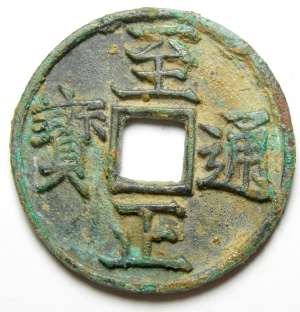 S-1103 orthodox script | IMAGE NOT AVAILABLE S-1102 Mongolian seal script |
Shun Ti adopted the title CHIH-CHENG in AD 1341 and used it until he died in 1367. This is an interesting series, in that many of the coins have date and/or denomination indicators on them.
S-1103. Bronze 1 cash. Obverse: "CHIH-CHENG T'UNG-PAO" in orthodox Chinese script. Reverse: "MAO" in Mongol seal script. MAO is short for HSIN MAO, indicating this coin was struck in AD 1351. The date indicator on the reverse is normally somewhat weak on these. Average (2 specimens) 25 mm, 3.55 grams.
F $65.00 VF $85.00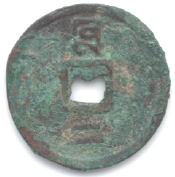
S-1109. Bronze 2 cash. Obverse: CHIH-CHENG T'UNG-PAO" in orthodox Chinese script. Reverse: The number "2" written in Mongolian script above the hole, and in chinese numbers below the hole. Average (2 specimen) 28.9 mm, 6.2 grams (range 5.04 to 7.15 grams)
F $65.00 VF $100.00S-1107. Bronze 3 cash. Obverse: "CHIH-CHENG T'UNG-PAO" in orthodox Chinese script. Reverse: "SSU" in Mongol seal script. SSU is short for Kuei Ssu indicating this coin was struck in AD 1353. Average (2 specimens) 30.1 mm, 8.5 grams.
F $75.00 VF $100.00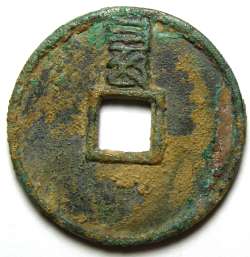
S-1108. Bronze 3 cash. Obverse: "CHIH-CHENG T'UNG-PAO" in orthodox Chinese script. Reverse: "SHEN" in Mongol seal script. SHEN is short for PING SHEN indicating this coin was struck in AD 1356. Average (1 specimens) 34.0 mm, 11.22 grams.
F $75.00 VF $115.00 XF $195.00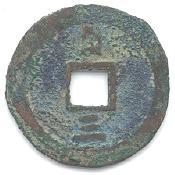
S-1110. Bronze 3 cash. Obverse: "CHIH-CHENG T'UNG-PAO" in orthodox Chinese script. Reverse: The number "3" written in Mongolian script above the hole, and in chinese numbers below the hole. Average (2 specimen) 35.5 mm, 11.55 (range 9.85 to 12.24 grams)
F $75.00 VF $110.00S-1111. Bronze 10 cash. Obverse: "CHIH-CHENG T'UNG-PAO" in orthodox Chinese script. Reverse: the denomination indicator as the Mongol seal script word for "10" above the hole. Average (two specimens) 45 mm, 22.9 grams.
F $75.00 VF $110.00FD-1810. Bronze 10 cash. Obverse: "CHIH-CHENG T'UNG-PAO" in orthodox Chinese script. Reverse: the denomination indicator as the Mongol square script word for "10" above the hole, and the Chinese number "10" with a dot above it, below the hole. Average (1 specimen) 48 mm, 63.6 grams. The casting on this particular coin is rather crude with only partially finished rims. The specimen illustrated while grading only F for visual appearance is pretty much as cast with full original file marks on the high points. This type tends to be bold and well cast with high rims but the edges tend to be poorly finished.
F $450.00YUAN REBELS
Pretender Emperor HAN LIN-ERH OF SUNG
AD 1351-1366
reign title: Lung-Feng, ca. AD 1355-1366
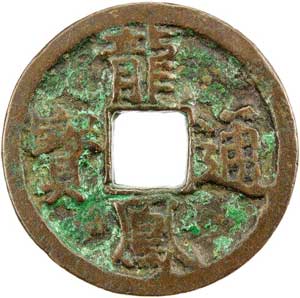
S-1115, Bronze 1 cash. Obverse: "LUNG-FENG T'UNG PAO". Reverse: blank. The image above and price below are for the 1 cash of about 3.5 grams, but this type is also known in a 3 cash of about 10.5 grams.
F $400.00 VF $700.00Pretender Emperor CH'EN YU-LIANG OF HAN
AD 1358-1363
reign title: T'ien-ting, ca. AD 1363
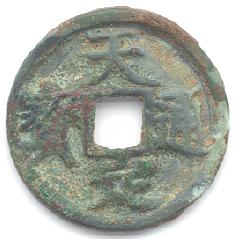
S-1124, Bronze 3 cash. Obverse: "T'IEN TING T'UNG-PAO". Reverse: blank. Average (2 specimens) 32.5 mm, 8.89 grams.
F $175.00 VF $245.00CHU YUAN-CHANG as the REBEL PRINCE WU
AD 1364-1367
Chu Yuan-Chang (later to become Emperor Tai Tsu, the first Emperor of the Ming Dynasty (see below)) was one of the Yuan Rebels fighting each other to see who would take control of China at the eventual fall of the Yuan Dynasty. His coins of this period bare the inscription TA-CHUNG T'UNG-PAO but TA-CHUNG is not actually a reign title.
I have run into some confusion over the Ta-Chung coinage, because Schjoth states that the inscription was first cast by Chu Yuan-Chang in AD 1361 when the Pao-Yuan Minting Department was set up at Nanking, however as he did not declare himself as Prince Wu until 1364, this draw into question exactly who he was minting them for between 1361 and 1364. Apparently only the 1 cash denomination was cast during this period.
In 1364, after defeating Ch'en Yu-liang of Han (another of the Yuan Rebels), and gaining control over a much larger part of China, Chu Yuan-chang declared himself the Prince Wu and adopted the reign title of Ta-ming but rather than putting the Ta-ming title on the coins he continued casting the Ta-Chung types, but now from a number of mints. In 1368 he controled enough of China to Declare himself as Emperor T'ai Tsu of the Ming Dynasty, at which time he adopted the reign title Hung-Wu.
The Ta-chung coinage tends to be somewhat crudely cast when compared to the later coins cast under the Ming Dynasty.
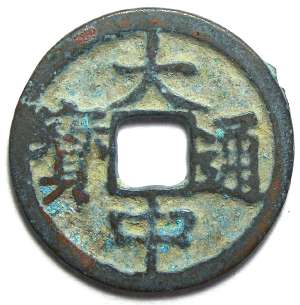 S-1127 |
S-1127. Bronze 1 cash. Obverse: "TA-CHUNG T'UNG-PAO". Reverse: blank. Average (5 specimens) 23.5 mm (range 23.2 to 24.0 mm), average 3.30 grams. These coins tend to be of inferior quality to the later coinage of Ming.
VG $4.50 F $8.50 VF $15.00The three below share the same obverse type and blank reverse, so only vary in their sizes.
S-1130. Bronze 2 cash. Obverse: "TA-CHUNG T'UNG-PAO". Reverse: blank. Average (1 specimens) 29 mm, 6.11 grams.
VF $35.00S-1131. Bronze 3 cash. Obverse: "TA-CHUNG T'UNG-PAO". Reverse: blank. Average (1 specimens) 35 mm, 10.10 grams.
VF $49.50S-1132. Bronze 5 cash. Obverse: "TA-CHUNG T'UNG-PAO". Reverse: blank. Average (1 specimens) 41 mm, 17.49 grams.
VF $42.50S-1128. Bronze 1 cash. Obverse: "TA-CHUNG T'UNG-PAO". Reverse: "PEI-P'ING" (a mint in Chihli). Average (1 specimen) 23.5 mm, 3.44 grams.
We do not have a record of a price for this type at this time.S-1129. Bronze 1 cash. Obverse: "TA-CHUNG T'UNG-PAO". Reverse: "CHE" (Chekiang mint). Average (1 specimen) 23.5 mm, 2.53 grams.
We do not have a record of a price for this type at this time.S-1133. Bronze 5 cash. Obverse: "TA-CHUNG T'UNG-PAO". Reverse: "YU" (Honan mint). Average (1 specimens) 40 mm, 15.41 grams.
VF $145.00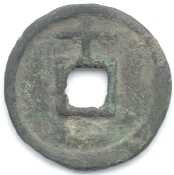
S-1134. Bronze 10 cash. Obverse: "TA-CHUNG T'UNG-PAO". Reverse: "SHIH" (for value 10). Average (2 specimens) 45.5 mm, 23.8 grams (these vary several grams either side of this).
VG $65.00 F $99.50S-1135. Bronze 10 cash. Obverse: "TA-CHUNG T'UNG-PAO". Reverse: "SHIH CHE" (for value 10 of Chekiang mint). Average (1 specimens) 45.5 mm, 25.69 grams. We have not yet recorded a value for this type.
S-1136. Bronze 10 cash. Obverse: "TA-CHUNG T'UNG-PAO". Reverse: "SHIH CHI" (for value 10 of Shantung mint)). Average (1 specimens) 45.5 mm, 27.09 grams.
We have not yet recorded a value for this type.MING DYNASTY
After 88 years of rule by the Mongols of the Yuan dynasty, the Chinese people finally regained control in AD 1368. The Ming dynasty is noted for a high degree of culture with a strong literature, and for the fine porcelain they produced.
There were a total of 17 emperors during the Ming dynasty. Most of them cast coins, but some of them are very rare. In spite of this being one of the more recent dynasties, the exact attribution of some of the rarer Ming coins is still in question.
Emperor T'AI TSU
AD 1368-1398
As discussed above, T'ai Tsu began his rise to power as the Yuan Rebel Chu Yuan-chang Prince of Wu. Most references include issues of that period as Ming Coins, although that is not technically correct and I have chosen to incude them under the correct heading as a Yuan Rebel.
reign title: HUNG-WU, AD 1368-1398
The Hung-wu reign title was adopted after the fall of the Yuan and the defeat of the other Yuan Rebels, thus this is the first true reign title of the Ming Dynasty.
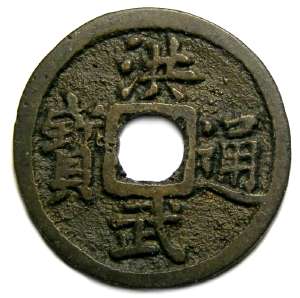 S-1137 |
S-1137. Bronze 1 cash. Obverse: "HUNG-WU T'UNG-PAO". Reverse: blank. Average (18 specimens) 23.8 mm, 3.50 grams (the weight vary considerable and we have records of specimens from 2.2 to 4.1 grams)
F $2.50 VF $4.50 XF $7.50Hung-Wu 1 cash are found with a number of reverse symbols and mint marks, of which we have so far noted the following. I will add images when available.
| IMAGE | DESCRIPTION | VALUE |
| NOT YET AVAILABLE | S-1138. Reverse: crescent at right | NOT YET DETERMINED |
| NOT YET AVAILABLE | S-1139. Reverse: crescent at bottom right | NOT YET DETERMINED |
| NOT YET AVAILABLE | S-1140. Reverse: crescent at left | NOT YET DETERMINED |
| NOT YET AVAILABLE | S-1141. Reverse: crescent at bottom slightly left | NOT YET DETERMINED |
| NOT YET AVAILABLE | S-1142. Reverse: YI-CH'IEN (1 cash) to the right | VG $2.50 F $4.50 XF $8.50 |
| NOT YET AVAILABLE | S-1143. Reverse: PEI-P'ING (Pei-p'ing Fu in Chihli) | VG $2.50 F $4.50 XF $8.50 |
| NOT YET AVAILABLE | S=1144. Reverse: YU (in Honan) | NOT YET DETERMINED |
| NOT YET AVAILABLE | S-1145, 1146. Reverse: CHE at top (Chekiang mint mark). One example with star hole. | F $5.00 VF $8.00 XF $10.00 |
| NOT YET AVAILABLE | S-1147. Reverse: CHE at top (Chekiang mint), with a crescent at lower right. | F $5.00 VF $8.00 XF $10.00 |
| NOT YET AVAILABLE | S-1148. Reverse: FU at bottom (Fukien mint). | F $5.00 VF $8.00 XF $10.00 |
| NOT YET AVAILABLE | S-1149. Reverse: FU at right (Fukien mint). | F $5.00 VF $8.00 XF $10.00 |
| NOT YET AVAILABLE | S-1150. Reverse: KUEI at right (Kuei-lin mint in Kuangsi mint). | NOT YET DETERMINED |
| NOT YET AVAILABLE | S-1151. Reverse: CHIH?? (reading uncertain). | NOT YET DETERMINED |
| NOT YET AVAILABLE | S-1152-3. Reverse: A symbol possibly representing a priest hat (Hung-wu had been a Buddhist priest prior to becoming Emperor). | NOT YET DETERMINED |
S-1154 variety. Bronze 2 cash. Obverse: "HUNG-WU T'UNG-PAO".
Reverse: "ERH CH'IEN". 31 mm.
S-1158. Bronze 10 cash (or 1 tael). Obverse: "HUNG-WU T'UNG-PAO". Reverse: "SHIH" (10) at the top and "YI-LIANG" (1 tael) to the right. Average (2 specimens) 48 mm, 34.8 grams.
F $60.00 VF $85.00Emperor CH'ENG TSU
AD 1403-1424
reign title: YUNG-LO, AD 1403-1424
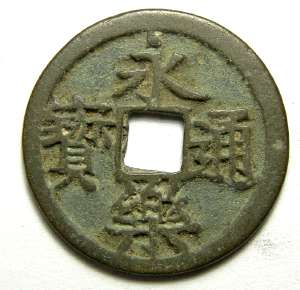 S-1166 |
S-1166. Bronze 1 cash. Obverse: "YUNG-LO T'UNG-PAO". Reverse: blank. Average (33 specimens) 25 mm, 3.75 grams.
F $2.00 VF $3.50Emperor HSUAN TSUNG
AD 1426-1435
reign title: HSUAN-TE, AD 1426-1435
| IMAGE NOT AVAILABLE S-1170 |
S-1170. Bronze 1 cash. Obverse: "HSUAN-TE T'UNG-PAO". Reverse: blank. Average (based on 2 specimens) 25 mm, 3.75 grams.
F $10.00 VF $16.50Emperor HSIAO TSUNG
AD 1488-1505
reign title: HUNG-CHIH, AD 1488-1505
| IMAGE NOT AVAILABLE S-1176 |
S-1176. Bronze 1 cash. Obverse: "HUNG-CHIH T'UNG-PAO". Reverse: blank. Average (2 specimens) 24.0 mm, 3.85 grams (range 3.25 to 4.45 grams).
VG $3.50 F $6.00 VF $9.50Emperor SHIH TSUNG
AD 1522-1566
reign title: CHIA CHING, AD 1522-1566
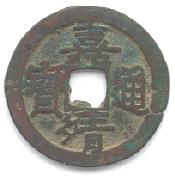 S-1181 |
S-1181. Bronze 1 cash. Obverse: "CHIA-CHING T'UNG-PAO". Reverse: blank. Average (2 specimens) 24.2 mm, 3.74 grams.
VG $4.00 F $7.50 VF $12.00This type is reported to have been cast in very large numbers in AD 1527 (6th year of Chia Ching). Schjoth (page 48) notes that in AD AD 1553 (32nd year of Chia Ching) there was another large issue of coins, but using the 9 earlier Ming reign titles following Hung-wu. It is very possible some of those reign titles were only cast at this time.
Emperor MU TSUNG
AD 1567-1572
reign title: LUNG-CH'ING, AD 1567-1572
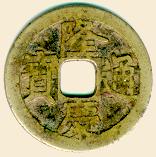 S-1183 |
S-1183. Bronze 1 cash. Obverse: "LUNG-CH'ING T'UNG-PAO". Reverse: blank. Average (2 specimens) 25 mm, 3.31 grams (range 2.88 to 3.75 grams).
F $60.00 VF $90.00Schjoth (page 48) reports that this type was cast in the year AD 1570.
Emperor SHEN TSUNG
AD 1573-1619
reign title: WAN-LI, AD 1573-1619
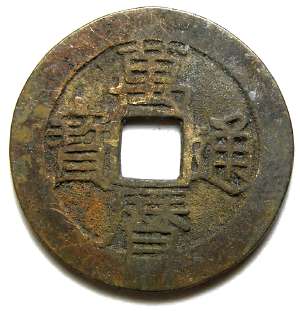 S-1185 |
S-1185. Bronze 1 cash. Obverse: "WAN-LI T'UNG-PAO". Reverse: blank, probably indicating this is an early issue of either Board of Revenue or Board of Works mint.
F $2.50 VF $4.00 XF $7.00An interesting feature sometimes seen on the coins of Wan-Li are chop marks (small merchants counter marks) applied on the rims of the coins. These do increase the value of the coins, but the exact amount of the increase depends on the number, and clarity of the marks. We have provided this link to an image of a typical specimen illustrating these chop marks. They are not obvious but if you look closely they are there.
Emperor KUANG TSUNG
AD 1620
reign title: T'AI-CH'ANG, AD 1620
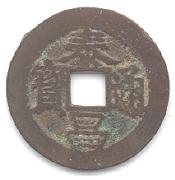 S-1199 |
S-1199, Bronze 1 cash. "T'AI-CH'ANG T'UNG-PAO". Reverse: blank. Average (3 specimens) 25.2 mm, 3.50 grams. The weights on these vary considerably. Of the three specimens I have weights on, the range is from 2.88 to 4.20 grams.
F $15.00 VF $25.00 XF $35.00S-1200, Bronze 1 cash. "T'AI-CH'ANG T'UNG-PAO". Reverse: Dot above centre hole.
F $15.00 VF $25.00 XF $35.00Kuang Tsung ruled for only one month and very few coins would have been issued during that time. Most specimens of this type were issued by his successor Hsi Tsung in 1621 in his memory. We are not yet sure if the two types, with and without the dot above the hole on the reverse, indicate the two mints of Board of Works and Board of Revenue mints (is so, we do know know which is which), or if they might differentiate between the life-time and non-lifetime issues.
Emperor HSI TSUNG
AD 1621-1627
reign title: T'IEN-CH'I, AD 1621-1627
| IMAGE NOT AVAILABLE S-1201 T'AI-CH'ANG T'IEN-CH'I |
S-1201, Bronze 1 cash. Obverse: "T'AI-CH'ANG T'IEN-CH'I". Reverse: Dot above center hole. This type is very rare, and we have never actually seen one, so cannot estimate a value. This is an interesting type, issued to honor the previous ruler who died after only one month on the throne, and may be the only Chinese cash coin to bare two reign titles on the same coin.
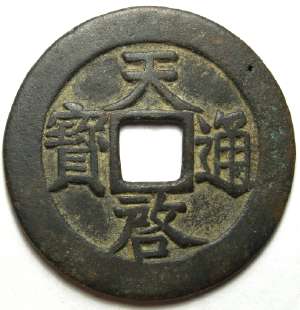 S-1223 T'ai-Ch'ang T'ung-Pao |
S-1202, bronze 1 cash. Obverse: "T'IEN-CH'I T'UNG-PAO". Reverse: blank so no mint indicated. There are a number of variations on this type with dots in various positions on the reverse. The meaning of these dots is not known.
F $3.50 VF $7.50 XF $12.00S-1214, bronze 1 cash. "T'IEN-CH'I T'UNG-PAO, Reverse: "YUN" for Yunnan mint.
F $12.00 VF $18.00HIGH DENOMINATION TYPES
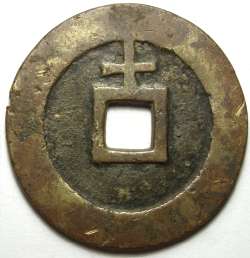
S-1221, Bronze 10 cash. Obverse: "T'IEN-CH'I T'UNG-PAO", Reverse: "SHIH" for value 10 cash at the top (without dot at bottom). Average (1 specimens) 45.0 mm, 24.55 grams.
F $25.00 VF $40.00 XF $55.00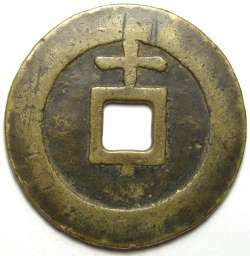
S-1222, Bronze 10 cash. Obverse: "T'IEN-CH'I T'UNG-PAO", Reverse: "SHIH" for value 10 at the top, DOT at bottom next to the rim. Average (2 specimens) 47.0 mm, 22.60 grams.
F $25.00 VF $40.00 XF $55.00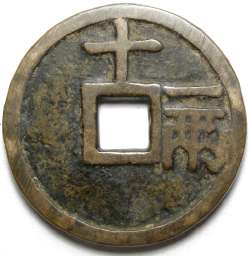
S-1223. Bronze 10 Cash or 1 Liang. Obverse: T'IEN-CH'I T'UNG-PAO. Reverse: "SHIH" (10) at the top, and "YI-LIANG" (1 Liang) to the right. These seem to come on two sizes, with the smaller average (3 specimens) 40.7 mm, 31.85 grams, and the larger with wider rims average (3 specimen) 47.2 mm, 34.53 grams.
small - F $25.00 VF $40.00large - F $35.00 VF $55.00
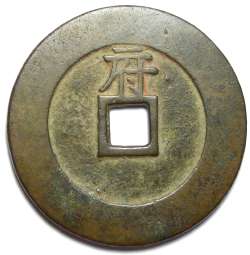
S-1224. Bronze 10 Cash or 1 Liang from Fu mint Obverse: T'IEN-CH'I T'UNG-PAO. Reverse: "FU" for Hsuan-ch'eng mint in An-hui. The denomination is not indicated by implied by the size and weight. Average (1 specimens) 47.0 mm, 26.33 grams.
small - F $75.00 VF $115.00Emperor CHUANG LIEH
AD 1628-1644
reign title: CH'UNG CHEN, 1628-1644
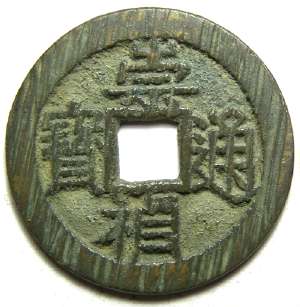 S-1228 |
S-1226-1229, bronze 1 cash. Obverse: "CH'UNG-CHEN T'UNG-PAO". Reverse: blank. Average (2 specimens) 24.0 to 24.9 mm, 2.98 grams (range 2.68 to 3.30).
F $5.00 VF $8.50 XF $15.00There are many variations of this type with different of dots and various characters on the reverse. We will make note of them as we have a chance. For the variations, the weights and sizes are the same as the main type unless otherwise noted.
S-1231-1232. Reverse dot at top. Average (2 specimen) 25.7 mm, 3.97 grams.
F $5.00 VF $9.50 XF $15.00MING REBELS
In AD 1644 the Chinese were once again conquered by foreigners as the Manchurians took control of much of China to establish the Ch'ing Dynasty, but reaching that point was a long drawn out process, starting about 70 years earlier and they did not gain full control for another 40 years. This was a period of turmoil during which a series of pretenders and rebels controlling small (some sometimes not so small) regions fought a series wars and rebellions at first against the Ming, later against the Ch'ing, and sometimes between each other. These people are referred to as the Ming Rebels and it is a fairly complex period in Chinese history.
The order in which Schjoth lists these rules does not give a sense of this history, and I am working on sorting out presentation that hopefully will do so, but I am not there yet. This is a section I am just now beginning to again work on, so hopefully there will be a better presentation here soon.
LI TZU-CH'ENG, AD 1644
Li Tzu-ch'eng was the son of a village leader in Shansi. After a period of famine and high taxation, Li and his followers revolted. The end of the Ming dynasty came in 1644 when Li succeeded in taking Peking. He assumed the reign title Yung-Ch'ang and declared himself emperor, upon which Chuang Lieh, the last Ming emperor, committed suicide.
Reign title: LI-YUNG, AD 1674-1677
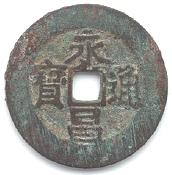
|
S-1325, Bronze 5 cash. Obverse: "YUNG CH'ANG T'UNG PAO". Reverse: blank. Average (2 specimens) 37.8 mm, and (range 13.73 to 15.30 grams. In high grades, these coins will show heavy original parallel files marks.
VF $55.00CHU YU-SUNG, PRINCE OF FU
AD 1644-1646
Chu Yu-Sung, as Prince of Fu, was the grand son of Shen Tsung (the Ming Emperor Wan Li). In the third month of 1644 he became Prince of Nanking, declared himself Emperor and issued coins under the Reign title of Hung-Kuang.
Reign title: Hung-Kuang, AD 1644-1446
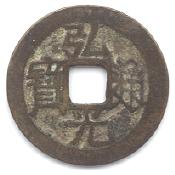 |
S-1287, Bronze 1 cash. Obverse: "HUNG-KUANG T'UNG PAO". Reverse: Blank. Average (1 specimens) 24.1 mm, 3.44 grams.
F $12.50 VF $18.00S-1288, Bronze 1 cash. Obverse: "HUNG-KUANG T'UNG PAO". Reverse: Dot at top. Average (2 specimens) 24.1 mm, 3.6 grams (range 3.02 to 4.17 grams).
F $10.00 VF $15.00PRINCE YUNG-MING
AD 1646-1659
Chu Yu-lang, Prince Yung Ming, was a grandson of Shen Tsung (the Ming Emperor Wan Li). In the 11th month of 1646 he was declared Emperor and set up his capital in Chao-ch'ing Fu in Kuangtung, and issued coins under the Reign title of Yung-li. In 1659 he was defeated by the Manchu (Ching Dynasty) army and when to Burma. Later he return of Yunnan province where he died in 1662. Both he and his mother became Christians.
Reign title: Yung-Li, AD 1646-1459
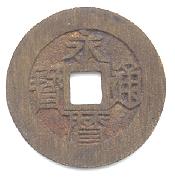 S-1296 Orthodox Script |
S-1296, Bronze 1 cash. Obverse: "YUNG-LI T'UNG PAO" in orthodox. Reverse: Blank. Average (3 specimens) 24.5 mm, 3.02 grams.
VG $3.00 F $5.00 VF $7.50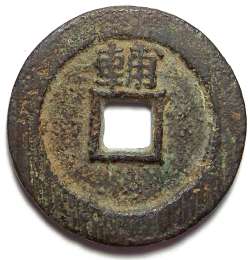
S-1307. Iron 1 cash. Obverse: "YUNG-LI T'UNG PAO" in orthodox script. Reverse: "FU" which is one character in a mandate given over a series of coins readomg "THE GOVERNOR-GENERALS, THE TAOTAIS, AND THE PREFECTS ARE CHARGED BY THE EMPEROR TO GUARD YUEH AND ASSIST MING TO SETTLE THE STATE". Average (1 specimen) 26.2 mm, 6.0 grams.
SMALL F $12.50 VF $30.00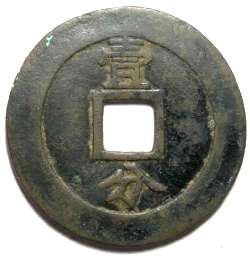
S-1321 and 1322. Bronze 1 candareen. Obverse: "YUNG-LI T'UNG PAO" in orthodox script. Reverse: "YIH-FEN" (one candareen). There are two sizes with the small (S-1321) average (6 specimens) 36 mm, 9.9 grams (they varied between 8.3 and 12.1 grams and the large (S-1322) average (1 specimen) 46 mm (no weight yet available).
SMALL F $12.00 VF $17.50 XF $25.00LARGE VF $35.00 XF $45.00
After casting, these coins were file finished in the mint with a fairly course rasp. On high grade specimens, the entire surface will be covered with fairly course file marks that run in one or two sets of parallel lines. These lines are clearly visible on the specimen illustrated.
| IMAGE NOT AVAILABLE YET S-1315 Seal Script |
S-1315. Bronze 2 cash, Obverse: "YUNG-LI T'UNG PAO" in seal script. Reverse: blank. Average (2 specimens) 28 mm, 5.1 grams (range from 4.66 to 5.4 grams).
F $40.00| IMAGE NOT AVAILABLE YET S-1316 Grass Script |
S-1316-7. Bronze 2 cash. Obverse: "YUNG-LI T'UNG PAO" in grass script (two slightly different variations, one of which could be called running hand script). Reverse: blank. Average (2 specimens) 28 mm, 5.26 grams (range 4.79 to 5.73 grams)
VF $20.00WU SAN-KUEI
AD 1674-1678
Wu San-kuei was a commander in the Ming army, but was born a Manchurian. When his father was killed, and favorite concubine taken by Li Tzu-ch'eng, he responded by giving his allegiance to the Ching, and taking Peking for them by defeating Li Tzu-ch'eng.
Wu San-kuei remained an advisor to the nine year old Shun Chih from the time he became Emperor of the Ching dynasty in 1644 until Shun Chih was able to rule for himself in1651. As a reward, he was made the ruler of the semi-autonomous province of Yunnan, where he used the title Li-yung, and his son was allows to marry a sister of Shun Chih.
In AD 1673, Wu San-kuei and four other generals, each holding similar positions in Kwangsi, Kwangtung, Fukien and Szechuan, rebelled against the Ching dynasty. He declared himself emperor in 1674, and continued using the reign title Li-yung until 1678 when he changed it to Chao-wu. The Ching moved against them, but the rebellion was successful until the death of Wu San-kuei in 1678. The rebellion came to an end with the suicide, in 1681, of his grandson (Schjoth says his son), Wu Shih-fan.
It is unlikely that any coins were cast by Wu San-kuei until after the start of the rebellion.
Reign title: LI-YUNG, AD 1674-1677
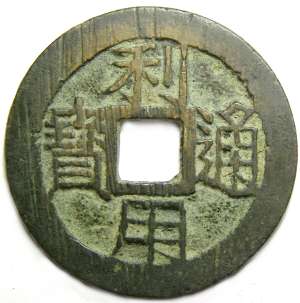 |
S-1335, Bronze 1 cash. Obverse: "LI-YUNG T'UNG PAO". Reverse: blank. The size and weight of this issue varies considerably, and we have seen them from 23.0 to 26.2 mm, and 3.0 to 5.0 grams. High quality specimens will show heavy original parallel files marks.
23-24.9 mm F $2.00 VF $4.00 XF $7.0025-26 mm F $3.00 VF $4.00 XF $9.00
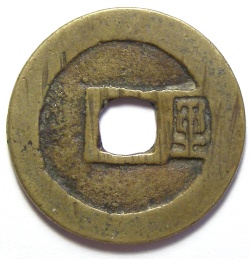
S-1336, Bronze 1 cash. Obverse: "LI-YUNG T'UNG PAO". Reverse: "LI" at right. Range (4 specimens) : we have seen these from 23.9 to about 26 mm, and 2.2 to 4.8 grams. In high grades, these coins will show heavy original parallel files marks.
F $5.00 VF $7.50 XF $12.00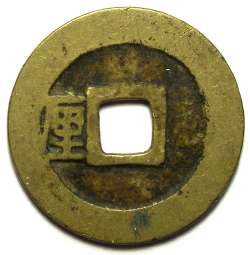
S-not listed, Hartill 21.88. Bronze 1 cash. Obverse: "LI-YUNG T'UNG PAO". Reverse: "LI" at left. These are included in the size and weight calculations above.
VF $25.00 XF $35.00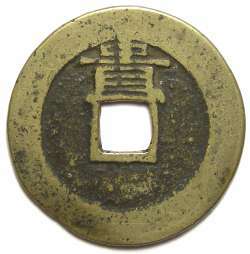
S-1337, Bronze 1 cash. Obverse: "LI-YUNG T'UNG PAO". Reverse: "KUEI" at right (for Kuei-chou Fu). Average (1 specimens) 24.5 mm, and 3.1 grams.
VF $7.50 XF $12.00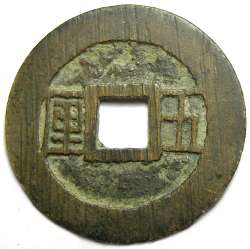
Hartill 21.97, S-1341 variety, Obverse: "LI-YUNG T'UNG PAO". Reverse: "WU LI" at the sides, meaning "value 5". Average (1 coin) 30.7 mm, 8.69 grams. Schjoth's #1341 is similar but had the reverse characters at the top and bottom.
F $30.00 VF $45.00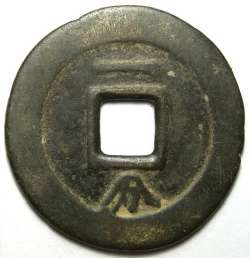
S-1343. Obverse: "LI-YUNG T'UNG PAO". Reverse: "YI FENG" at the top and bottom, meaning "one candareen". This come in two sizes, with the smaller size average (4 coin) 40.16 mm, 14.17 grams, and the larger average (2 coins) 44.5 mm, 17.40 grams.
Small : F $20.00 VF $30.00Large : F $40.00 VF $65.00
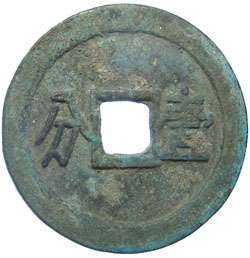
S-1343. Obverse: "LI-YUNG T'UNG PAO". Reverse: "YI FENG" at the top and bottom, meaning "one candareen".
H 21.99. Obverse: "LI-YUNG T'UNG PAO". Reverse: "YI FENG" to the right and left, meaning "one candareen". The one coin of this type we have had was 40.03 mm, 40.16 mm, 22.35 grams. This is one of the scarcer coins of Wu San-Kuei.
Small : F $65.00 VF $99.00Reign title: CHAO-WU, AD 1678
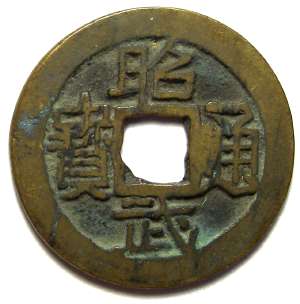 S-1345 Orthodox Script | 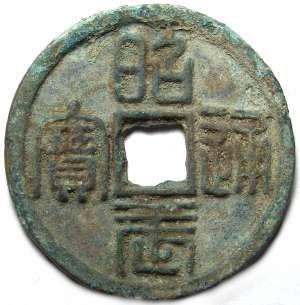 S-1347 Seal Script |
S-1345, Bronze 1 cash. Obverse: "CHAO-WU T'UNG-PAO" in orthodox writing. Reverse: blank. Average (3 specimens) 24.0 mm, 3.65 grams.
VG $2.00 F $3.00 VF $5.00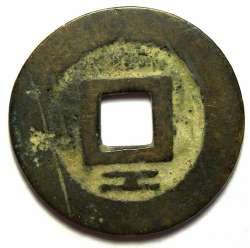
S-1347. Bronze 1 cash. Obverse: "Chao-Wu T'ung-pao" in orthodox script. Reverse: "KUNG" (for the board of works mint). A average (1 specimen) 23.5 mm, 3.37 grams.
F $7.50 VF $11.00 XF $17.50S-1344, Bronze 1 cash. Obverse: "CHAO-WU T'UNG-PAO" in seal script. Reverse: blank. I have not yet recorded size and weight, but they are similar to the orthodox script type of this denomination.
F $85.00 VF $115.00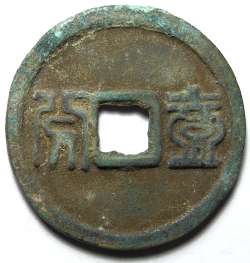
S-1347. Bronze 1 candareen. Obverse: "Chao-Wu T'ung-pao" in seal script. Reverse: "YI FEN" (1 candareen). A average (1 specimen) 35.3 mm, 12.97 grams.
F $35.00 VF $65.00 XF $110.00WU SHIH-FAN
AD 1678-1681
As the grandson (or possibly the son) of Wu San-kuei, Wu Shih-fan continued the revolt started by his father. He committed suicide in AD 1681 when defeat by the Ching became certain. As with other of the so called Ming rebels, he minted coins with the mint marks of the Board of Works and Board of Revenue. It again seems impossible that these were really minted in Peking.
Reign title: HUNG-HUA, AD 1678-1681
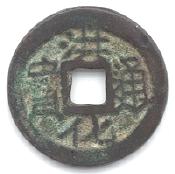 |
S-1348. Bronze 1 cash. Average 3.5 mm, 3.56 grams (4 specimens). Obverse: "HUNG-HUA T'ANG PAO". Reverse: blank.
F $2.00 VF $5.00KENG CHING-CHUNG
AD 1673-1676
Keng Ching-Chung was a feudal lord in Fukian province, after his father (who did not issue any coins) was given that region after they aided the Manchus in forming the Ching dynasty. When K'ang Hsi attempted to take away their land in AD 1674, he joined with the other Feudal lords in rebellion. He surrended to the forced of the Ch'ing and fought for them against the other feudal lords in 1676, but was later executed by them in 1682.
Reign title: YU-MIN, AD 1674-1676
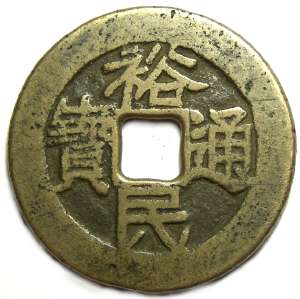
|
Bronze 1 cash. S-1352. Obverse: "YU-MIN T'UNG-PAO". Reverse: blank. Average 26 mm, 4.40 grams.
F $15.00 VF $25.00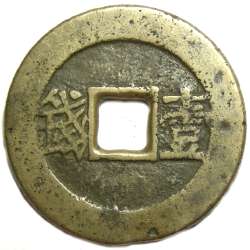
Bronze 100 cash. Hartill 21.124, S-1354 variety, Obverse: "YU-MIN T'UNG-PAO". Reverse: "YIH CH'IEN" meaning one mace, which is a silver denomination equivalent to 100 cash. Average 37.5 mm, 17.08 grams (1 specimen).
F $50.00 VF $75.00These coins, in higher grades, show heavy original file marks.
CHANG HSIEN CHUNG
AD 1644
Chang Hsien Chung was known as an extremely evil man. Fortunately, he did not last very long. His coins are fairly large and robust, and are used as charms by seafarers.
Some of his coins bear mint marks for the Board of Works and Board of Revenue. As Peking was under the control of his rival Li Tzu-ch'eng, these mints were not available to Chang. It is more likely that he was using the same mint names in his capital of Ch'eng-tu. Other Ming rebels seem to have used the same practice.
Reign title: TA-SHUN, AD 1644
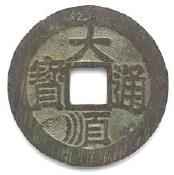 S-1326 |
S-1326. Bronze 1 cash. Obverse: "TA-SHUN T'UNG-PAO". Reverse: blank. Average (10 specimens) 27 mm, 4.87 grams.
F $6.00 VF $12.00 XF $17.50S-1327. Bronze 1 cash. Obverse: "TA-SHUN T'UNG-PAO".
Reverse: "HU" (board of revenue mint). Average (10 specimens) 27 mm, 4.87 grams.
S-1328. Bronze 1 cash. Obverse: "TA-SHUN T'UNG-PAO". Reverse: "KUNG" (board of works mint). Average (10 specimens) 27mm, 4.87 grams.
F $8.00 VF $15.00 XF $20.00Note that S-1326 to 1328 are all part of one issue, and the average size and weight calculation is based on specimens of all three combined. This is well cast series and the weights and sizes are very consistent. When in high grades, they have clear very parallel file marks on the surfaces. The rims are very square with sharp edges.
SUN K'O-WANG
AD 1644-1650
Sun K'o-Wang was the adopted son of Hang Hsien Chung. After the death of Hang, Sun K'o went to Yunnan where he cast the Hsing-Chao coins, one of which bears a Board of Works (KUNG) mint mark, but must have been minted after Sun-K'o left Peking. This is further evidence that he and his father were using Board of Revenue and Board of Works as the names of their principal mints, but that these are not the mints in Peking.
In 1650, Sun K'o-Wang surrendered to the Ching and became known as the patriotic prince.
Reign title: HSING-CHAO, AD 1644-1650
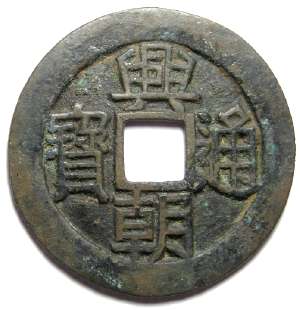 S-1330 |
S-1330. Bronze 1 cash. Obverse: "HSING-CHAO T'UNG-PAO". Reverse: "KUNG" (board of works mint).
VF $10.00 XF $17.50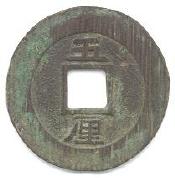
S-1332. Bronze larger 5 cash. Obverse: "HSING-CHAO T'UNG-PAO". Reverse: "WU LI" (5 cash). The size of this type varies considerable, but on the average (4 specimens), but are normally around 35 mm, 9.65 grams (range 7.7 to 11.6 grams).
VF $25.00 XF $35.00
S-1333. Bronze large 1 candareen. Obverse: "HSING-CHAO T'UNG-PAO". Reverse: "YIH FEN" (1 candareen). The size of this type varies considerable, the specimen I recently measured was 49.5 mm. Average weight (3 specimens) 21.31 grams
VF $25.00 XF $35.00CHU-YU-CHIEN, Prince of T'ang
AD 1645-46
Reign title: LUNG-WU, AD 1645-1646
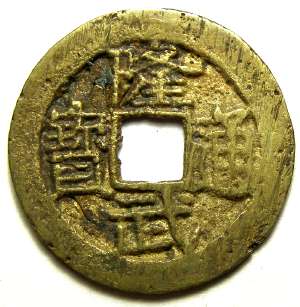 S-1292 |
S-1292. Bronze 1 cash. Obverse: "LUNG-WU T'UNG PAO". Reverse: dot at the top. ca. 23.5 mm.
VF $15.00S-1295. Bronze 2 cash. Obverse: "LUNG-WU T'UNG PAO". Reverse: blank. Average (6 specimens) 26.3 mm, 4.32 grams.
VF $45.00 XF $65.00The Ching Dynasty, AD 1644-1911
Copyright © 1997 - 2025 R & T Enterprises Ltd.
